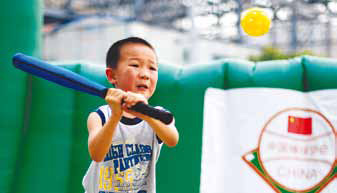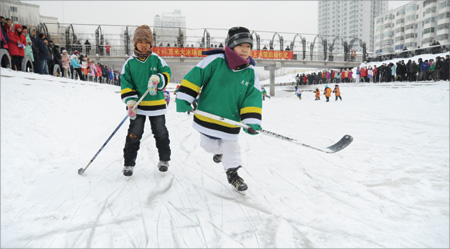Life
American sports getting more popular
Updated: 2011-07-19 11:02
By Todd Balazovic (China Daily)
|
|
Wealth, prestige and expats are driving new interest in games such as hockey, Todd Balazovic reports.
Ping-pong and badminton have dominated Chinese sports for years, but as the country goes global, scores of the nation's youth are embracing America's favorite pastimes.
The country's rapid development, surging incomes and interest in Western culture have attracted leagues of Chinese parents to enroll their children in the core American sports: football, hockey, basketball and baseball.
"In general, there is a rising tide in interest in sport, (the Chinese) are broadening their horizon outside what are core China sports," said Richard Young, managing director for the National Football League in China.
While Yao Ming's recruitment to the Houston Rockets in 2002 earned basketball a fanbase of 300 million and throngs of spirited participants - with National Basketball Association team jerseys now a common sight in Chinese cities - other core American sports have been left in the shadows.
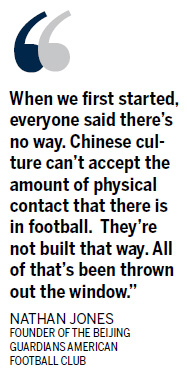 |
But China's performance in world sports following the 2008 Beijing Olympics sparked a sudden growth in amateur club sports and spurred a generation of young athletes to look beyond China's traditional sports.
"Not to say the cores are becoming any less played - but there's been an increase in number of players and varieties of which sports are played in China," Young said.
Young, who has watched the sports industry in China grow for more than 20 years, said he does not expect the lesser known American sports such as football to have a "Yao Ming moment", but said the country's increasingly diversified tastes will see American sports experience a massive boost over the next five to 10 years.
"It's the natural progression for a developing country," he said.
Behind the drive to bring American athletics to China are expat enthusiasts sharing their love for the game.
At the beginning of 2011, Nathan Jones, founder of the Beijing Guardians, China's first full-contact American football club, spent more than 300,000 yuan ($46,000) out of pocket, shipping 60 full sets of pads and helmets from the US to the capital in a bid to jumpstart the sport.
He said he was shocked when more than two dozen Chinese players showed up at Dongdan Park in central Beijing for the club's first free training session six months ago, expecting just foreign players familiar with the sport to show interest.
"The motivation, the goal, is to develop the program in Beijing to help start teams in other cities like Shanghai and Guangzhou," Jones said.
Since they began about six months ago, the team has grown to more than 50 members, 80 percent of which are Chinese, Jones said.
"All of my friends play football," said Chen Siyu, a 21-year-old student at Beijing Normal University and wide receiver for the Beijing Guardians.
Chen first heard of the Guardians from a friend who encouraged him to tag along to one of their training sessions. After going once, he was hooked.
"I had never played (football) before, but I wanted to find a sport that required strength, speed and smarts. It provides all three, " he said.
While Chen's large build (he's 6 feet, 180 pounds) may lend itself to football, the typical Chinese frame tends to be much smaller than the American, so many were critical of Jones' attempts to bring the hardy sport to the East.
"When we first started, everyone said there's no way. Chinese culture can't accept the amount of physical contact that there is in football. They're not built that way," Jones said.
"All of that's been thrown out the window."
He said with more people in the city able to afford gym memberships and yearning to build muscle mass, there is a larger pool of Chinese players built for the rigorous sport.
Chen and his friends may embrace the rough nature of football, but it's not just size that matters - there's a cultural barrier. Chen says culturally, contact sports such as American football and hockey often go against what Chinese consider polite.
"In the minds of many Chinese people, the sport is considered rude because it's so physical," Chen said.
|
|
Though many traditional Chinese may consider the rough contact of American sports like football and hockey "rude" or dangerous, it's the physical nature of the sports that attracts some parents to get their children involved.
For Annie Ma, mother of 9-year-old junior hockey player Jerry Hu, getting her son in a sport that made him more "manly" is what pushed her to sign him up for a youth hockey league at the age of 6.
"When he was young, he looked like a girl. I wanted to put him in a sport that gave him good muscle, made him tough," she said.
Ma leaped at the chance to sign her son up for skating and hockey lessons after Hu showed interest in a group of older foreign children hitting a puck around at a skating rink in a local mall.
Hu now plays for the Beijing Imperial Guard Youth Hockey Club, one of a number of junior hockey leagues that have sprung up in Beijing over the past five years. The club, which is sponsored by Li Ning, one of China's largest sports brands, contains about 40 children aged from 4 to 15, 70 percent of which are Chinese, said Mark Simon, coach for the Beijing Imperial Junior hockey league.
What Ma did not realize when she signed her son up for the Imperial Guards was the price tag of his newfound passion.
Buying a set of equipment costs roughly 9,750 yuan at one of the hard to find suppliers in Beijing, and the yearly cost paying for time on the ice averages about 13,000 yuan, slightly more expensive than in the US because of the high demand for the capital's limited number of ice rinks.
Though it's still a large step up from a 50-yuan basketball and free courts found dotted throughout most Chinese cities, for Ma, who grew up in a more traditional family, supporting her son's passion superseded frugality.
"You know the Chinese have a tradition. When we spend money on something for our children, we don't think of it in terms of expensive or not expensive. We just give it," she said.
"If we can, we want to give our children as much as possible that's just our tradition."
While Ma has no qualms justifying the hefty cost, the average Chinese worker, making 2,000-3,000 yuan a month, would probably urge their children to play basketball.
"For the typical Chinese person, these sports are not that accessible. If you don't have the money, you can't play," Simon said.
And like the large sport utility vehicles or designer clothes flooding the streets of Chinese cities, getting a child involved in an international sport, particularly one with high costs, is also a way to show off prestige.
"I think the parents who will put their kids into hockey are the same type that want their kids to learn English. They're interested in other cultures and have the disposable income to provide. It's really a status symbol that says 'I can afford this'," Simon said.
While hockey and football are taking fresh steps into the Chinese market, baseball is pushing to further its edge in the growing youth sport spectrum.
Despite setbacks in 2005 after baseball was removed from the list of Olympic sports, the China Baseball Association in partnership with Major League Baseball in the US has made massive strides to increase the sport's popularity in China on a grassroots level.
"We did meet some difficulties in promoting this event in China since it is no longer an Olympic sport event and the government won't invest too much money in it," said Shen Wei, secretary-general of the China Baseball Association.
But the removal from the list of Olympic sports pushed baseball's youth program development into the hands of the private sector, creating a more competitive environment for growth. So far, it's been successful, she said.
"We are happy to see more young parents, especially the middle class families, training their children in this sport," she said.
Even though price is still an issue, baseball has recently experienced a jump in popularity with more than 100 university teams and a growing number of youth leagues, Shen said.
But she recognizes that with all sports looking to gain the support of China's blossoming middle class, if baseball wants to do well, it's got to become Chinese.
"If baseball truly going into China, it needs to be played by Chinese, administrated by Chinese and umpired by Chinese. It has to be a Chinese sport. And ultimately that's our goal," she said.
Fu Yu contributed to this story.

Specials
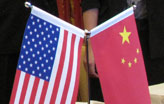
China-US Governors Forum
The first China-US Governors Forum is held July 15 in the Salt Lake City, the United States.

My China story
Foreign readers are invited to share your China stories.
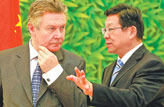
Rare earths export quota
China kept its export quota at almost the same level as last year.
